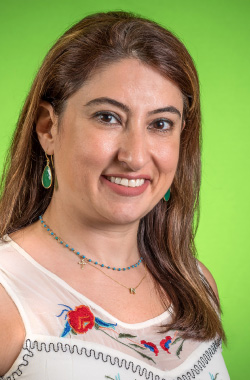National Cancer Survivors Day celebrates life beyond a cancer diagnosis
- Category: Living Well, Cancer Care
- Posted On:
- Written By: Dr. Nelly Aoun

This coming Sunday, the National Cancer Survivors Day Foundation will celebrate its 34th annual National Cancer Survivors Day. As the Foundation has noted, worldwide, the first Sunday of June is marked “ as a day for everyone to join in solidarity with cancer survivors around the world, to raise awareness of the ongoing challenges cancer survivors face because of their disease, and – most importantly – to celebrate life.”
Cancer survivorship
In 1987, Merril Hastings announced the first-ever National Cancer Survivors Day while spearheading a meeting of the National Coalition for Cancer Survivorship in Albuquerque, New Mexico. Today, millions of people worldwide are considered cancer survivors, meaning they have completed cancer treatment with no sign of the disease. However, others prefer the term “cancer survivorship” because they continue to live with, through, and beyond a cancer diagnosis. As the American Cancer Society explains, ”Cancer isn’t always a one-time event. Cancer can be closely watched and treated, but sometimes it never completely goes away.”
For people whose cancer is completely gone and life is back to normal, National Cancer Survivors Day is a time to celebrate. However, many more people do fall into the cancer survivorship category, as their battle continues, and some for many, many years. Oncologists or doctors who treat cancer patients explain that survivorship typically has three phases:
- Acute – begins upon diagnosis of cancer and continues through the end of cancer treatment
- Extended – begins at the end of the initial cancer treatment and continues for months after until it’s learned if the treatment was successful
- Permanent – the feeling of survivorship continues for years, well after treatment has ended, yet there is still uncertainty of the long-term impacts of treatment and cancer itself
For family and friends of anyone diagnosed with cancer, it’s important to understand how a person’s life can dramatically change following a cancer diagnosis. No two people are alike, but emotions can run the gambit following cancer treatment because of many factors:
- Relief that treatment is over, but continued anxiety about the future, especially a fear that cancer will return
- Anxiety over relationships that may have been impacted during treatment
- Work-related challenges
- Fear of being treated differently or unfairly after being sick
If you know someone undergoing cancer treatment or considers themselves part of the survivorship, the best thing you can do is be there for that individual, providing as much or as little help as they desire. The goal of anyone facing a medical issue, whether it’s cancer or something else, is to live life as normal as possible, and providing support is one way to make sure that happens.
At West Jefferson Medical Center, we are passionate about supporting our survivors in a variety of special ways.
- Our Cooking for a Cure program focuses on quick, easy and healthy recipes to help a body fight cancer and give more energy.
- Annually, we host ScART, an empowering group painting experience that allows cancer survivors to explore the way they perceive their scars.
- We partner with YouNight Empowering Events, a sisterhood support group offering year-round, empowering group activities to help women live their best lives after a cancer diagnosis.
More people survive cancer today than two decades ago
While the statistics show how deadly cancer is, there is hope. Today, more than 17 million Americans live with and beyond cancer; more than 43 million worldwide, and that’s encouraging news. When it comes to survivors:
- Some 67 percent were diagnosed five or more years ago
- Some 17 percent were diagnosed with cancer more than 20 years ago
- Nearly half are over age 70
While this is great news, there’s a need for more improvement, especially in our region. When it comes to Louisiana, the American Cancer Society estimates that this year, the state will see 27,880 new cancer cases, with more than 9300 deaths from cancer. As with most things, prevention is the best medicine, and there are things you can do to prevent some forms of cancer, such as:
- Refrain from all tobacco use
- Eat a healthy, well-balanced diet
- Maintain a healthy weight
- Protect your skin when in the sun
- Get regular medical check-ups
As an oncologist at West Jefferson Medical Center, I encourage everyone to make healthier decisions to avoid a cancer diagnosis. I also encourage everyone to take time this Sunday to remember and reach out to someone who considers themselves a cancer survivor or to someone who is living with cancer. Let them know you are celebrating their life as it stands today and thinking about them and that you are there to help with any challenges that lie ahead. It will be the best call you make this weekend.
About Dr. Nelly Aoun
Dr. Nelly Aoun is a board-certified physician in Internal Medicine, Hematology and Oncology. After finishing medical school at the Lebanese University of Beirut, Lebanon she moved to the United States in 2005 and completed her residency in Internal Medicine and fellowship in Hematology-Oncology at Staten Island University Hospital in New York. She started her career as a Medical Director/Founder of the Hematology-Oncology services of the Mississippi Cancer Institute, a division of the Southwest Medical Health System in McComb, Mississippi (2012-2015). She joined West Jefferson Medical Center Cancer Care in 2016. Her interests in Hematology-Oncology include diagnosing and treating a different variety of cancers, clinical research and palliative care. She has also started an early screening and prevention program to detect and manage patients with high-risk of developing breast cancer.